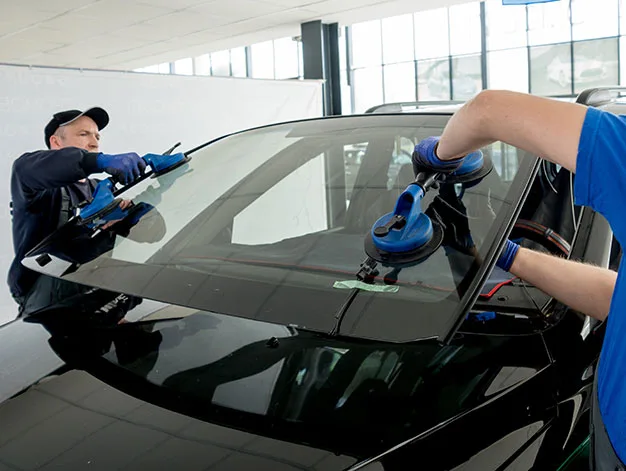The Importance of Auto Glass in Vehicle Financing and Leasing
Understanding Auto Glass in the Context of Vehicle Value
Glass quality matters when you lease or finance a car. Here's why:
- Safety = value: Strong, intact glass is a must
- Good glass = higher resale price: Important for lease deals
- Tech features boost appeal: Heads-up displays, etc.
- Maintenance is key: Fixing chips preserves the car's worth
Damaged or outdated glass could mean less favorable loan terms.
Auto glass is crucial in vehicle financing and leasing. It affects safety, resale value, and compliance with standards. High-quality glass ensures durability and enhances the vehicle's market appeal. Innovations, like break-resistant glass and integrated tech, increase security and driver experience. They affect leasing terms and brand perception. Regular maintenance and compliance with safety standards are vital for favorable financing terms.

Safety and Durability: Key Considerations in Auto Financing
Safety is a top priority for both vehicle owners and finance companies. The strength and durability of auto glass are vital in protecting passengers. This durability also means the vehicle keeps its structure over time. Lenders consider this when valuing a vehicle for financing or leasing.
Impact on Resale Value: A Leasing Perspective
From a leasing perspective, the condition of auto glass is a determinant of the vehicle's residual value. Such vehicles have damaged windshields or windows. They often fetch lower prices. This hurts the financial viability of leasing agreements. So, keeping glass in good condition helps both the lessee and the lessor.
Auto Glass Insurance: A Financial Cushion
Insurance coverage for auto glass repair or replacement can be a game-changer in vehicle financing and leasing. It offers a financial cushion, safeguarding against unexpected expenses. Financial institutions find this coverage attractive. It keeps the vehicle in top condition, preserving its value.
Technological Advancements in Auto Glass
In the age of advanced cars, the role of auto glass goes beyond just function. Automakers are adding features to auto glass. These include heads-up displays, solar control, and acoustic dampening. They enhance the vehicle's value and appeal in the finance and leasing market.
Auto Glass: More Than Just a Component
In conclusion, auto glass is not just a part of a vehicle. It's a key asset. It greatly affects the finances of owning and leasing a vehicle. Its impact on safety, durability, and tech advances makes it a key factor. It determines the value of a vehicle in financing and leasing.
Innovations in Auto Glass Enhancing Vehicle Security
New auto glass tech is set to revolutionize vehicle security. This is a critical factor in financing and leasing. The features include enhanced, break-resistant glass and integrated alarm systems. They provide added security. They also increase the vehicle's value and desirability in the financing market. For lenders and lessees, these advanced security features mean more protection. They also mean lower insurance costs.
The Impact of Auto Glass on Driver Experience
The quality and features of auto glass significantly influence the driver experience. Innovations like noise-reducing glass or glare-reducing coatings can greatly improve driver comfort. They can also improve driver focus. They lead to a safer driving experience. For financial institutions, these features show how well a vehicle can keep its value. They also show how desirable it is. They improve leasing terms and resale values.
Auto Glass Maintenance and its Financial Implications
Regular maintenance and timely repair of car glass are essential. They preserve a vehicle's value, a key concern for finance and leasing companies. Good upkeep can stop small problems from becoming big ones. This cuts long-term costs and keeps the vehicle looking and working well. Financial institutions see a well-kept vehicle as a lower-risk investment. This view often leads to better financing terms.
Regulatory Compliance and Auto Glass Standards
Automakers must follow auto safety standards. This is especially true for auto glass. It is crucial for vehicle financing and leasing. Such vehicles are often more attractive to financial institutions. They meet or exceed the standards, so they have lower risk and better safety compliance. This compliance affects the financing terms and enhances the vehicle's marketability.
The Role of Auto Glass in Brand Perception and Value
Car glass can greatly affect how people see a vehicle brand. It affects their view of its quality and reliability. Brands use high-quality, durable, and innovative glass in their vehicles. They are seen as more desirable and reliable. This boosts their financing and leasing attractiveness. This brand perception is crucial. It determines a vehicle's residual value. Residual value is key in leasing.
Customization of Auto Glass in Vehicle Financing
Auto glass has customization options. These include varying levels of tinting, shapes, and features. They offer chances for personalization. This can add to a vehicle’s appeal. These options can be a big selling point. They are for the financing and leasing market. They let lessees and buyers tailor the vehicle to their preferences. This could increase its value.
Conclusion:
A Comprehensive View of Auto Glass in Vehicle Financing
In conclusion, auto glass plays many important roles. It affects vehicle financing and leasing. Auto glass enhances safety and driver experience. It also influences brand perception and meets regulatory standards. It is crucial to a vehicle's value and appeal. The auto industry is evolving. Auto glass will become more important to the money side of owning and leasing vehicles. It will be key for financiers, lessees, and buyers to consider.
